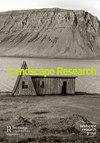Restorative urban environments for healthy cities: a theoretical model for the study of restorative experiences in urban built settings
IF 1.7
3区 社会学
Q3 ENVIRONMENTAL STUDIES
引用次数: 14
Abstract
Abstract Urban landscapes are becoming the main ecosystem for human life. Given that urban living can be associated with poor psychological health, one specific challenge faced by cities is related to psychological well-being. The current essay discusses how restorative environments research can offer significant insights into the strategy of healthy cities by guiding the exploration of their restorative outcomes. We propose a theoretical model elucidating the physical and symbolic features of urban settings that can aid processes of active and passive restoration—based on theory and evidence from restorative environments research. Future research should consider urban psychological restoration in a broader sense and lend greater relevance to the exploration of the restorative potential of the full range of urban built settings. HIGHLIGHTS There is a need to explore the characteristics of urban built settings that support psychological health. We propose a three-level model of restoration that discusses supportive features and potential benefits. Active restoration—activated by top-down features—enhances positive affect and well-being in non-stressed individuals. Future research should broaden theoretical definitions and explore the full range of restorative built settings.健康城市的恢复性城市环境:城市建筑环境恢复性体验研究的理论模型
城市景观正在成为人类生活的主要生态系统。鉴于城市生活可能与心理健康状况不佳有关,城市面临的一个具体挑战与心理健康有关。本文讨论了恢复性环境研究如何通过指导对其恢复性结果的探索,为健康城市战略提供重要见解。基于恢复性环境研究的理论和证据,我们提出了一个理论模型,阐明了城市环境的物理和符号特征,这些特征有助于主动和被动的恢复过程。未来的研究应该在更广泛的意义上考虑城市心理修复,并为探索各种城市建筑环境的修复潜力提供更大的相关性。有必要探索支持心理健康的城市建筑环境的特征。我们提出了一个三级恢复模型,讨论了支持功能和潜在利益。主动恢复——由自上而下的特征激活——增强了无压力个体的积极影响和幸福感。未来的研究应拓宽理论定义,全面探索恢复性建筑环境。
本文章由计算机程序翻译,如有差异,请以英文原文为准。
求助全文
约1分钟内获得全文
求助全文
来源期刊

Landscape Research
Multiple-
CiteScore
3.70
自引率
16.70%
发文量
63
期刊介绍:
Landscape Research, the journal of the Landscape Research Group, has become established as one of the foremost journals in its field. Landscape Research is distinctive in combining original research papers with reflective critiques of landscape practice. Contributions to the journal appeal to a wide academic and professional readership, and reach an interdisciplinary and international audience. Whilst unified by a focus on the landscape, the coverage of Landscape Research is wide ranging. Topic areas include: - environmental design - countryside management - ecology and environmental conservation - land surveying - human and physical geography - behavioural and cultural studies - archaeology and history
 求助内容:
求助内容: 应助结果提醒方式:
应助结果提醒方式:


